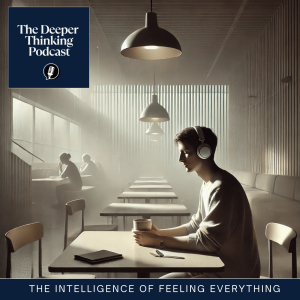
Wednesday Mar 26, 2025
The Intelligence of Feeling Everything – The Deeper Thinking Podcast
The Intelligence of Feeling Everything
Some perceptions don’t arrive with sound—they shimmer, flicker, echo softly through the body before the mind can name them.
You’re in a café. The world seems still. But someone across the room flinches—not at a crash or a scream, but at the flicker of a fluorescent bulb. The pitch of laughter. The shift in mood before words even catch up. We live in a culture that praises speed, volume, and decisiveness. But what happens to those who feel before they know? Who notice before they speak? What happens to people for whom the world is not simply seen or heard—but registered, metabolized, carried?
Sensitivity, as it’s often framed, is mistaken for fragility. But what if it’s a form of intelligence? A cognitive style adapted for nuance, depth, and relational texture? Drawing from frameworks like Sensory Processing Sensitivity, Mirror Neuron Theory, and Differential Susceptibility, this episode explores the deeper structure of high sensitivity—not as an emotional overreaction, but as a perceptual design. Thinkers like Elaine Aron, Antonio Damasio, and Byung-Chul Han help frame sensitivity as both a neurological pattern and a cultural contradiction—at once a survival trait and a social inconvenience.
But the stakes go deeper than theory. In workplaces, schools, relationships—sensitive people often perform invisible labor. They absorb tension, anticipate needs, soften spaces. Their attention is not loud, but it is constant. And the cost of this attunement, unrecognized, can become a quiet erosion. They are not the loudest voices, but often the most necessary ones. In a world that grows noisier each day, what does it mean to protect the ones who still listen before they speak?
How do we make space for people whose intelligence shows up not in performance, but in perception?
Why Listen?
• What if emotion isn’t the opposite of intelligence—but its foundation?
• In a world designed for speed, what happens to those who move through nuance?
• Who holds the tension in a room no one names?
• What might change if we treated perception itself as a moral act?
Further Reading
As an affiliate, we may earn from qualifying purchases through these links.
📖 The Highly Sensitive Person – The foundational guide to understanding sensory processing sensitivity. 🔗 Amazon affiliate link
📖 The Burnout Society by Byung-Chul Han – A critique of overstimulation and cultural acceleration. 🔗 Amazon affiliate link
📖 The Feeling of What Happens by Antonio Damasio – On emotion as central to consciousness and self. 🔗 Amazon affiliate link
📖 Quiet by Susan Cain – A portrait of the power of the inward and reflective. 🔗 Amazon affiliate link
📖 Parable of the Sower by Octavia Butler – A speculative look at empathic survival in a fractured world. 🔗 Amazon affiliate link
Support Us
https://www.buymeacoffee.com/thedeeperthinkingpodcast
🎧 Listen On:
🔹 YouTube
🔹 Spotify
🔹 Apple Podcasts
Abstract
This essay explores high sensitivity not as a psychological weakness, but as a cognitive, emotional, and evolutionary strategy rooted in sensory processing sensitivity (SPS). Through a reflective and culturally situated lens, it reframes sensitivity as a form of perceptual intelligence—characterized by deep processing, environmental attunement, and empathic resonance. Drawing on frameworks from neuroscience, philosophy of mind, behavioral ecology, and cultural criticism, the essay challenges dominant narratives that pathologize sensitivity, especially within capitalist, overstimulated societies. The work positions highly sensitive individuals as vital outliers whose ways of knowing often go unrecognized but are essential for social coherence and ethical depth. By integrating the theories of Elaine Aron, Antonio Damasio, Miranda Fricker, Byung-Chul Han, and others, the essay situates sensitivity as a site of epistemic injustice, emotional labor, and quiet resistance. The piece concludes by calling for new cultural architectures that support, rather than suppress, this underacknowledged cognitive style.
Bibliography (APA 7th Edition)
Aron, E. N. (1996). The highly sensitive person: How to thrive when the world overwhelms you. Broadway Books.
Aron, E. N., & Aron, A. (1997). Sensory-processing sensitivity and its relation to introversion and emotionality. Journal of Personality and Social Psychology, 73(2), 345–368. https://doi.org/10.1037/0022-3514.73.2.345
Belsky, J., & Pluess, M. (2009). Beyond diathesis stress: Differential susceptibility to environmental influences. Psychological Bulletin, 135(6), 885–908. https://doi.org/10.1037/a0017376
Boyce, W. T., & Ellis, B. J. (2005). Biological sensitivity to context: I. An evolutionary–developmental theory of the origins and functions of stress reactivity. Development and Psychopathology, 17(2), 271–301. https://doi.org/10.1017/S0954579405050145
Damasio, A. R. (1999). The feeling of what happens: Body and emotion in the making of consciousness. Harcourt.
Fricker, M. (2007). Epistemic injustice: Power and the ethics of knowing. Oxford University Press.
Han, B.-C. (2015). The burnout society (E. Butler, Trans.). Stanford University Press. (Original work published 2010)
Hochschild, A. R. (1983). The managed heart: Commercialization of human feeling. University of California Press.
Kagan, J. (1994). Galen's prophecy: Temperament in human nature. Basic Books.
Turkle, S. (2011). Alone together: Why we expect more from technology and less from each other. Basic Books.
Wolf, M., van Doorn, G. S., Leimar, O., & Weissing, F. J. (2008). Life-history trade-offs favour the evolution of animal personalities. Nature, 451(7184), 581–584. https://doi.org/10.1038/nature06560
Comments (0)
To leave or reply to comments, please download free Podbean or
No Comments
To leave or reply to comments,
please download free Podbean App.